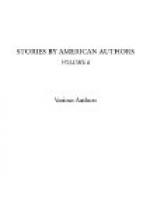Little Marie learned by degrees to smile again, and in after years married another arrow-head maker, as swarthy and as shaggy as the Black Beaver. There is no moral to my story except that of poetic justice. Pere Francois Xavier had sown a plentiful crop of stratagems, and he learned in the lonely forest that “Whatsoever a man soweth that shall he also reap.”
Meanwhile to all but you, my readers, the Crevecoeur cameo remains as great a mystery as ever.
MISS EUNICE’S GLOVE
By Albert Webster.
I.
For a long time blithe and fragile Miss Eunice, demure, correct in deportment, and yet not wholly without enthusiasm, thought that day the unluckiest in her life on which she first took into her hands that unobtrusive yet dramatic book, “Miss Crofutt’s Missionary Labors in the English Prisons.”
It came to her notice by mere accident, not by favor of proselyting friends; and such was its singular material, that she at once devoured it with avidity. As its title suggests, it was the history of the ameliorating endeavors of a woman in criminal society, and it contained, perforce, a large amount of tragic and pathetic incident. But this last was so blended and involved with what Miss Eunice would have skipped as commonplace, that she was led to digest the whole volume—statistics, philosophy, comments, and all. She studied the analysis of the atmosphere of cells, the properties and waste of wheaten flour, the cost of clothing to the general government, the whys and wherefores of crime and evil-doing; and it was not long before there was generated within her bosom a fine and healthy ardor to emulate this practical and courageous pattern.




